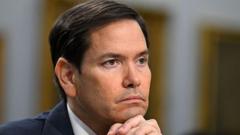In Charleston, S.C., a significant legal showdown unfolded as the city challenges major oil companies in a lawsuit alleging decades-long misinformation about climate risks. The case questions whether such lawsuits threaten national security, a claim recently made by former President Trump. As legal representatives from both sides presented their arguments in court, the implications of this battle could redefine climate accountability and corporate responsibility.
Climate Lawsuit in Charleston: Is National Security at Risk?

Climate Lawsuit in Charleston: Is National Security at Risk?
A Charleston lawsuit against oil companies raises crucial questions about climate change and national security as Trump's executive order defines the narrative.
This week, the courtroom in Charleston became a battleground for a pivotal climate lawsuit where the city asserts that prominent oil companies, including ExxonMobil and Chevron, engaged in a prolonged campaign of misinformation regarding the dangers of climate change. The suit, filed in 2020, accuses these companies of intentionally misleading the public about environmental risks associated with their practices.
Complicating matters, President Trump issued an executive order labeling climate lawsuits against oil companies as a threat to national security, suggesting that they could result in excessive financial repercussions for the nation. This order marks a shift in the federal stance on climate litigation, prompting the Justice Department to file lawsuits in states like Hawaii and Michigan to block local climate suits from progressing. Despite these federal efforts, states remain undeterred, with Hawaii proceeding with its case and Michigan's attorney general planning to follow suit.
During the recent court hearings, Judge Roger M. Young Sr. invited legal teams to discuss the intersection of Trump's executive order with the ongoing case. Theodore J. Boutrous Jr., representing Chevron and other defendants, contended that the executive order supports the notion that federal law should govern emissions and that state-level lawsuits are inappropriate for addressing such issues.
This lawsuit not only highlights the ongoing tension between state and federal jurisdictions regarding climate action but also raises critical questions about accountability for environmental harm. As the legal process unfolds, the outcome could set a significant precedent for future climate litigation across the country, potentially reshaping how corporations address the impacts of their operations on climate change.
The legal arguments presented in Charleston reflect the broader ideological divide over environmental policy and corporate responsibility, with potential ramifications extending beyond the courtroom to the national political landscape.
As these hearings continue, stakeholders in both the environmental and corporate sectors will be closely monitoring developments to gauge the future of climate change litigation and its implications for public health and safety at the local and national levels.
Complicating matters, President Trump issued an executive order labeling climate lawsuits against oil companies as a threat to national security, suggesting that they could result in excessive financial repercussions for the nation. This order marks a shift in the federal stance on climate litigation, prompting the Justice Department to file lawsuits in states like Hawaii and Michigan to block local climate suits from progressing. Despite these federal efforts, states remain undeterred, with Hawaii proceeding with its case and Michigan's attorney general planning to follow suit.
During the recent court hearings, Judge Roger M. Young Sr. invited legal teams to discuss the intersection of Trump's executive order with the ongoing case. Theodore J. Boutrous Jr., representing Chevron and other defendants, contended that the executive order supports the notion that federal law should govern emissions and that state-level lawsuits are inappropriate for addressing such issues.
This lawsuit not only highlights the ongoing tension between state and federal jurisdictions regarding climate action but also raises critical questions about accountability for environmental harm. As the legal process unfolds, the outcome could set a significant precedent for future climate litigation across the country, potentially reshaping how corporations address the impacts of their operations on climate change.
The legal arguments presented in Charleston reflect the broader ideological divide over environmental policy and corporate responsibility, with potential ramifications extending beyond the courtroom to the national political landscape.
As these hearings continue, stakeholders in both the environmental and corporate sectors will be closely monitoring developments to gauge the future of climate change litigation and its implications for public health and safety at the local and national levels.






















